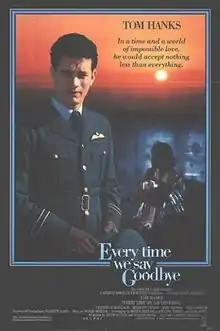Every Time We Say Goodbye (film)
Every Time We Say Goodbye is a 1986 American drama film starring Tom Hanks and Cristina Marsillach. Hanks plays a gentile American in the Royal Air Force, stationed in mandatory Jerusalem, who falls in love with a girl from a Sephardic Jewish family.
| Every Time We Say Goodbye | |
|---|---|
 Theatrical release poster | |
| Directed by | Moshé Mizrahi |
| Produced by |
|
| Written by |
|
| Starring | |
| Music by | Philippe Sarde |
Production company |
|
| Distributed by | TriStar Pictures |
Release date |
|
Running time | 95 minutes |
| Country | United States |
| Language |
|
| Budget | $3.7 million[1] |
| Box office | $278,623 |
The film has the unusual distinction of being partly in the Ladino language. With young lovers of very different backgrounds with religious/cultural differences, the film is an account of a forbidden love, and the sacrifices that are made in the face of prejudice.[2]
Plot
Lt. David Bradley (Tom Hanks) is an American pilot who joins the Royal Air Force (RAF) before the United States enters World War II. After his Boeing B-17 Flying Fortress bomber is shot down in North Africa, he recovers from a leg injury in Jerusalem.
During his recovery, David meets Sarah Perrara (Cristina Marsillach), a serene girl of Spanish Jewish descent. The two young people are attracted to each other but she is convinced that their diverse backgrounds mean it could never work. Her family's disapproval and the fact that he is a gentile son of a Protestant minister, stand in their way.
Although they keep running into each other in the small community, they find themselves parting as frequently as they find each other.
Cast
- Tom Hanks as David Bradley
- Cristina Marsillach as Sarah Perrara
- Benedict Taylor as Peter Ross
- Anat Atzmon as Victoria Sasson
- Gila Almagor as Lea
- Monny Moshonov as Nessim (credited as Monny Moshonov)
- Avner Hiskyahu as Raphael (credited as Avner Hiskyahu)
- Esther Parnass as Rosa
- Orna Porat as Mrs. Finkelstein
- Nissim Azikri as Shaltiel (credited as Nissim Azikry)
- Moshe Ivgy as Daniel (credited as Moshe Ivgi)
- Orit Weisman as Mathilda
- David Menachem as Elie
- Avi Keidar as Sammy
- Alon Aboutboul as Joseph (credited as Alan Abovtboul)
- Dafna Armoni as Clara (credited as Daphne Armony)
Production
After his breakout role in Splash (1984), Tom Hanks signed on to star in Every Time We Say Goodbye. The drama was a departure from his earlier comedic television and screen roles.[3] Hanks was also ready to devote time to establishing a more serious catalog, but in contrast to the Hollywood films he had worked on, considered Every Time We Say Goodbye at $3.7 million, a "low budget" production. [4] Much of the film was shot on location in Israel, including in the King David Hotel, Jerusalem.[2]
Reception
At the time, Every Time We Say Goodbye was considered to be the most expensive Israeli film ($3.7 million), however, the film was a major box office bomb, with worldwide gross of only $278,623. To this day, according to Box Office Mojo, it remains the lowest grossing theatrically released film starring Hanks.[5] Reviews of the film were lukewarm at best, and the film had a limited release in theaters.[1]
In a review for The New York Times, film critic Janet Maslin noted: "Tom Hanks is utterly out of place in the Israeli romance 'Every Time We Say Goodbye,' which opens today at the Criterion and other theaters, for at least two reasons: because there's something so innately comic about him, even in solemn surroundings, and because he has so much more energy than the film does. As directed by Moshe Mizrahi ('Madame Rosa', 'I Love You Rosa'), this love story is mostly notable for its strained, awkward small talk and its long, long pauses."[6]
References
Notes
- Cast list as credited on screen, first billed only
Citations
- "Film: 'Every Time We Say Goodbye'." TV Tropes. Retrieved: March 9, 2017.
- "Overview: 'Every Time We Say Goodbye' (1986)." IMDb. Retrieved: March 9, 2017.
- Gardiner 1999, p. 85.
- Pfeiffer and Lewis 1996, p. 66.
- "Film: 'Every Time We Say Goodbye'." Box Office Mojo. Retrieved: March 9, 2017.
- Maslin, Janet. "The Screen: Goodbye." The New York Times, November 14, 1986. Retrieved: March 9, 2017.
Bibliography